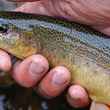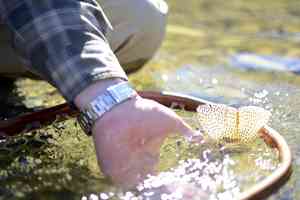It takes two short questions to expose just how viscerally brain-bending fishing can be.
The first is ‘Why do we go fishing?’ This isn’t subtle and needs just 3 words for an answer. Maybe there’s someone out there who’ll say they don’t go fishing to catch fish, but I’ve never met them. There’s no shortage of secondary reasons such as good company and beautiful locations, but they’re all predicated on the idea that we go fishing to catch fish. The clue is in the name. This answer, as I will demonstrate, is wrong.
So here’s the second question: What’s your most memorable One That Got Away? The Special One. That oh-so-nearly fish of cruelly snuffed gratification? Make a mental note of your answer.
“I shall remember that son of a bitch forever,” — Norman Maclean, A River Runs Through It.
We’ve all lived the moment: A fish takes, the water boils silver, sinews strain and adrenaline surges. Then suddenly, catastrophically, the rod is weightless and a flaccid line shapes a languid downstream curl. Time pauses until reality bleeds back in, but the void and the fish that filled it are infinite.
Many of our most memorable losses come early in life. For example, the 3lb wild trout in a small stream when I was 14. We parted company in the dying of the day with only the bats as a witness. And still it stalks me. This is odd because at 12 I had caught a bigger wild trout in more challenging conditions. Yet I remember every detail of the one I lost and a lot less of the one I netted. I am not alone in this, and the difference between the two matters. People who remember a tantalising near-miss more acutely than a success attract psychologists, drawn vulture-like to a nascent psychosis.
“It is good to lose fish. If we didn’t, much of the thrill of angling would be gone.” — Ray Bergman.
All fly fishing, especially salmon and steelhead, is conducted against increasingly steep odds. A cursory glance at the catch returns makes for dismal reading. So, as we head for the river, we save face by telling anyone who’ll listen that there’s too little or too much water, the wrong wind, nets in the estuary, bloody farmers, bloody pollution, bloody this and bloody that and, of course, bloody climate change. It’s gonna be tough.
And as fast as we lay down the reasons for why fishing is futile, we ignore them. Well, I do, and I expect you do, too. OK, the river’s not looking great, but after several blank days flogging warm, low water there’s a single lacklustre fish showing and I’m due some luck.
“Look on the bright side,” I say to myself, “What are the odds against yet another fishless outing? This is going to be my day.” And therein lies trouble because this is magical thinking. The men and women in white coats will identify it as the Gambler’s Fallacy, another red flag for psychosis.
Psychosis: noun (psychoses)
Characterised by a loss of contact with reality and an imperative belief that one's actions are rational.
The Fallacy works like this: At the Casino de Monte-Carlo on 18 August 1913 the ball fell on black 26 times in a row. As the streak lengthened gamblers lost millions betting on red because, surely, the next spin could not be yet another black.
According to my abacus, the odds on 26 successive blacks are about 135m:1 — give or take several million. But the odds of the next spin going Red are always 2:1 regardless of what happened the spin before (for pedants, the true odds on a roulette table are 37:18). The point is that a spin of the roulette wheel is not affected by the previous spin, just as a fishless week cannot make tomorrow successful.
‘Ah,’ you say, ‘in a casino I’m at the mercy of the House, but when fishing I can make my own luck’. This is true, but only up to a point. For example, we could go fishing only on days when all the conditions are perfect. And we could fish well-stocked waters. And choose a lucky fly, buy a cool hat, cast perfectly and in all manner of ways take control.
Which is why we always catch and release a creel-full. Except, of course, we don’t. The only near odds-on certainty about fly fishing is that nobody catches anything without a line in the water. Everything else is marginal. As John Gierach almost says: You can change your fly and catch a fish, or you can stick with the old one and catch a fish — or not. I know of only one exception to this rule: A friend who caught his first salmon with a gaff (and helpful gillie) on a fine Scottish river. This is not encouraged nowadays.
The next psychosis red flag is the kicker for anglers, and it’s also rooted in gambling. If you have ever played a casino one-armed bandit you’ll know how this feels: You pull the handle or press the button and the wheels spin. Click, click, click — 3 oranges line up across the screen, left to right. The 4th wheel spins a little longer until the last orange drops into the line, pauses, twitches, harrumphs and then shudders one place onward with its last gasp. It’s a heart-wrenching moment of loss, because in that skipped beat the ecstasy roar of cascading coins filled your ears.
The excitement of this fruity near miss is so strong that it can be seen on an MRI scan. Brain activity hits peaks akin to sex or drugs in a scanner light show so awash with dopamine that it’s visibly more exciting, and addictive, than an actual win. The subconscious brain desperately wants to do that again, and again, and again. The manufacturers know this and are in a continual battle with the regulators to deliver plenty of these near misses. In terms of brain activity, that last orange is up there with great sex, a mirror covered with cocaine - or that fish, the really big one that got away. We want more – and we want it NOW. Which cues this:
“I wouldn't recommend sex, drugs or insanity for everyone, but they've always worked for me.” — Hunter S Thompson.
As always, Thompson was onto something. Somewhere between the showboating and the drink, drugs, sex and dopamine, he rode a compulsive wave that we can all relate to, even if we can’t ride it as hard or fluently as he did.
Behavioural problems are persistent and the younger we start the harder they are to shake off. So the fish we lost as a teenager set our already hormone-addled and overstimulated brains on fire. An explosion of dopamine made us fishing junkies. That’s because our inner teenage ape was still learning how to swing through the trees — and although catching the next branch was important, having it slip through our fingers was much more memorable; but only if we survived. The biggest lessons in life are learned in failure.
In my experience, people who dabble in fishing and then quit do not have a One That Got Away. They get out before it’s too late. Which would be laudable, but they then miss out on all the fun: The exquisite pain of that lost fish.
And as salmon aficionado and serial author Max Hastings so accurately summed up: “I can remember almost every salmon I have ever lost with much better clarity than the fish I have landed.”
So let’s revert to my opening question: ‘What’s your most memorable One That Got Away?’. I expect it’s not really just the one, is it? Even though I lost count years ago, they’re all still swimming around in the back of my mind like fish in a deep, clear-water pool, some occasionally rising to the surface before sinking back again, others always in view.
It’s not just that we regular fishermen and women are losers, we’re serial losers.
Paradoxically, we rationalise fishing as the sport of catching fish.
No, it isn’t.
This article first appeared in the Finnish magazine Chasing Silver.





























Comments
Scott replied on Permalink
I subscribed to Richard's newsletter, he has a lot of great stuff. Thanks for posting!
Jim Parks replied on Permalink
My “big one that got away” occurred in July 6, 1986 in a stream in the Smoky Mountains. I still know the exact rock where it was hiding. It got to within a foot of my net before a head shake broke it off. It was caught a few weeks later and was 32” 10 lb 8 oz brown
One other also 30” was within 10 feet and we held a stalemate until it dangle in a fallen tree.
But, I did land a 27” monster this summer!
Jim Parks
Michael Bernhard replied on Permalink
I have a clear memory from Psychology 101 that we routinely remember our failures more vividly than our successes, I just can ‘t remember the name of the researcher or study that established that phenomenon!
Pages